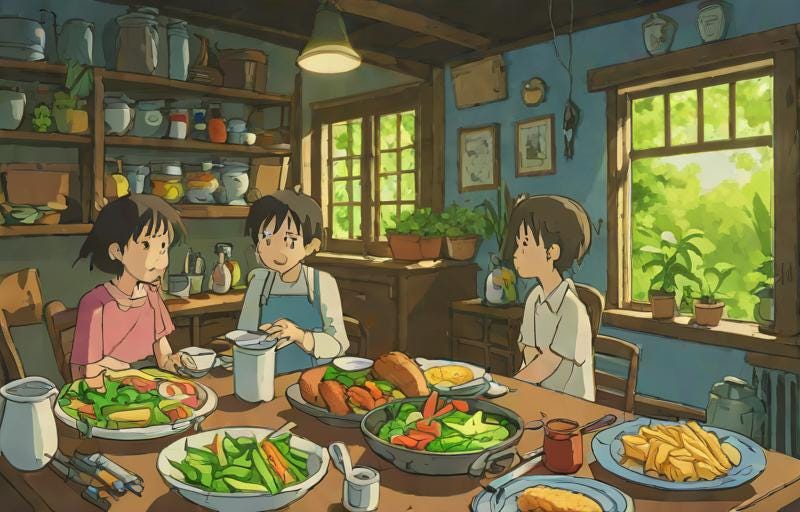Welcome to new readers! Have you had the chance to explore my Free Reads and the entire Catalog of posts yet? The best way to experience this publication is to read a diverse set of posts under Ancient India, Modern India, Travel, and Culture. I include backstory links, and relevant stories to provide more context. Sometimes, stories have detailed notes, with additional cultural insights. If you have questions, feel free to join the chat!
I recalled an interesting story about the Preserver-God in his Krishna incarnation, so a quick retelling is in order. Hope you enjoy it! Check out its related backstory in this series of the five righteous brothers and their wife, Draupadi.
The five righteous brothers, the Pandavas1, and their spirited, virtuous, and beautiful wife, Draupadi,2 lived in the forest, having lost their kingdom and wealth to their wicked cousins.
Draupadi was a princess born from fire. She emerged from the sacrificial fire when her father, King Draupada, invoked the gods seeking a child. It is believed she was destined to become the catalyst for the destruction of evil. So it turned out in the end.
Each of the brothers was renowned in his own right.
The eldest, Yudhishthira, was the wisest of all men on Earth. The second, Bhima, was celebrated for his unmatched strength. The third, Arjuna, stood out as a brave warrior, mastering the bow and arrow like no other, and was Krishna’s favorite among them. The youngest two were twins, acclaimed for their exceptional beauty and virtue.
Their days in exile were spent training to keep themselves fit in their warrior skills, catering to their daily needs, and visiting holy places3 and sages, or receiving them if they chose to call upon their forest dwellings.
One afternoon, a famous sage, along with a hundred other sages in his entourage, arrived at their dwelling to bestow upon them the honor of their presence.
The five brothers received them with all due respect and were informed by the pleased sage that they would be happy to eat their afternoon meal with them.
The eldest brother wholeheartedly welcomed them to join for a meal.
The sage was pleased and requested them to wait while the sages went to the river to refresh themselves.
The brothers informed Draupadi of this uninvited list of guests and offered to undertake any tasks she set them to help.
Saying no4 is not advised, even in modern times. What then to speak of the duty of the householder in ancient times when powerful sages could curse in extreme ways?
Draupadi became worried as she knew this sage had a bad temper. With their already challenging circumstances, she dreaded incurring his wrath.
But what was to be done?
The five brothers and Draupadi had just finished their lunch.
They possessed a magical container,5 a boon from the Sun-God, capable of replenishing its food an unlimited number of times, but only until Draupadi had eaten.
Unfortunately, not anticipating any visitors, Draupadi had already partaken of her afternoon meal.
There were no more food supplies that could be used for the unexpected arrival of a hundred and one guests, who likely anticipated a sumptuous meal.
She sat quietly in front of the kitchen fires, saddened by the state of their lives. Once they had riches galore, clothes befitting the King, Princes, and Princesses they were, and household help that spared her from fretting about what food to serve her family or guests.
The brave brothers, sons of mighty gods who feared none on Earth and served all with righteousness and truth, had to live in poverty, hardship, and exile for the sake of upholding Dharma.
If even the mighty and righteous Pandavas and Draupadi faced such trials, one might wonder about the prospects for ordinary humans, who may not maintain such impeccable conduct or adherence to righteous paths. Yet, could the enduring lesson from their lives be that a commitment to righteousness inevitably draws allies and fortuitous circumstances to those serving the cause of Truth?
During the exile, whenever Draupadi found herself dwelling on the humiliation she had faced, her anger threatened to consume her. Over time, however, she cultivated forbearance, relegating those painful memories to the back of her mind as she awaited the day her husbands would avenge her honor.
Angry tears mingled with sadness flowed now as she pushed them away with her hand.
Her despair deepened. “Krishna, what shall I do?” Her heart asked with conviction, directing the question at the only friend she felt she could truly rely on. Her silent plea echoed inwardly.
No sooner had she the thought than a knock sounded on her hut door. Afraid the brothers would ask her for an update, or the sages may have returned, she turned frantically.
But it was Krishna, standing at the door, smiling as only Krishna knew how—self-assured with an all-knowing expression and yet, without a care in the world. His crown, still adorned with the peacock feather, his hand carrying the flute with which he had lightly tapped the door.
Draupadi was taken aback at seeing him.
“Krishna,” she exclaimed, rising and extending her hands eagerly. “I am so happy to see you, I was just thinking of you.”
Krishna smiled at her eagerness. “I was in the vicinity and thought to come see my dearest sister.”
Draupadi's face blossomed at his words. “I am fortunate you took the time to visit us.”
Krishna replied, “Yes, but I also came because I am hungry. What food do you have for me?”
Her face fell. “I do not have anything to serve you. We finished our meal, and there is nothing left. How unfortunate is my life that I cannot serve you or the sages who are bound to descend on us any minute,” she lamented to her dear friend sharing her predicament.
Krishna smiled and said, “Are you sure, Draupadi? I am certain there is some food left.”
Draupadi was astonished that he would think she wouldn't offer him food. “Krishna,” she exclaimed, “I promise you, I have no food in the house. No grains either to cook. Alas, my dear friend, if you had only come an hour earlier, I would have served you with joy.”
But Krishna refused to accept her protests. He said, “Show me your container.”
Bewildered by his insistence that there was food, she fetched the pot in which she had cooked rice for them and showed him the empty container.
“What's this? I see food here,” he said. So saying, he removed a single grain of white rice that was still stuck to the sides of the cooking pot and ate it.
After eating the grain, he said, “Ah! I am so full and satisfied. What marvelous food you have served me, dear Draupadi.”
Draupadi watched in amazement as he ate the grain of rice. Surely he was joking.
What was she to do now?
Unknown to her, the sages at the river, after bathing, were dressing to come to her home. Suddenly, they felt so full as though they had enjoyed a sumptuous meal— all one hundred and one of them, including the powerful sage who led them.
Fearing they might be compelled to eat when they could not stomach another morsel, the sages slunk away, thus ensuring they would not impose upon the five brothers or Draupadi for a meal at least on that afternoon.
From the moment Krishna declared he was satisfied with the meal, every living being in the Universe was also instantly satisfied.
Krishna smiled at something he saw in his inner mind. Draupadi was still standing anxiously in front of him.
He then told her, “Don’t worry. The sages will not return. Come, let us join Arjuna and the others, and speak of different matters.”
So saying, he escorted her outside. Trusting him, she followed.
The brothers and the now calm Draupadi happily reunited with their support, friend, advisor, and dearest companion, Krishna, whose very presence made them forget the injustice done to them.
The name refers to the sons of King Pandu.
She is the daughter of King Draupada, hence, her name became Draupadi.
These locations are primarily recognized from ancient texts and oral tales passed down through generations. Notably, there is a village named Pandavapura, located an hour or two from Bangalore, which translates to 'the village of the Pandavas.' It is so named due to the belief that the Pandavas once visited or resided in the vicinity. This highlights that, despite being categorized as 'mythology,' these stories are often believed to be rooted in historical events.
Whenever a sage, even an ordinary one without special powers, visits a Hindu home seeking alms or meals, it is the duty of every householder to feed them. Sages are considered to be serving God, and they rely on the alms they receive from householders for their daily meals.
This container was called ‘Akshaya Patra’ in Sanskrit. Akshaya = inexhaustible; Patra = vessel.






I love this!
There are so many great stories around the gods, food, and fullness: Ganesha and Kubera, Hanuman and Sita, and more. This Krishna story is unique in that he satisfies everyone. Thank you, Jayshree!
Thank you for this Jayshree! I know this story well but your retelling made me tear up